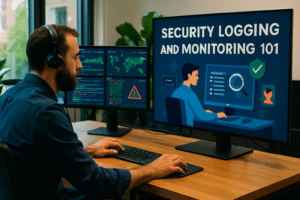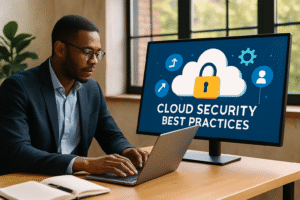
How VPNs work
In a digital world where privacy is as contested as bandwidth, the concept of a Virtual Private Network (VPN) has become both mainstream and misunderstood. Many know the acronym, few truly grasp the depth behind it. Let’s unravel what a VPN is, how it works, and why it’s increasingly crucial for professionals, learners, and anyone navigating the intricate webs of technology.
Understanding the Core: What is a VPN?
At its heart, a VPN is an encrypted tunnel between your device and a remote server operated by the VPN provider. When you connect to the internet through a VPN, your data travels through this tunnel, shielded from prying eyes—be it hackers, ISPs, or even government agencies.
But a VPN isn’t just about secrecy. It’s about control. It lets you decide who sees your online activity and what digital footprint you leave behind. Whether you’re a software developer, a remote worker, or a student accessing online courses, a VPN empowers you to define the boundaries of your digital identity.
The Mechanics: How Does a VPN Actually Work?
When you activate a VPN client on your device, it performs several key functions:
- Encryption: Data transmitted between your device and the VPN server is encrypted, making it unreadable to outsiders.
- IP Masking: Your real IP address is replaced by the VPN server’s address, effectively anonymizing your location and identity online.
- Tunneling Protocols: The VPN uses specialized protocols—such as OpenVPN, WireGuard, or IKEv2/IPsec—to establish and maintain the secure connection.
This process is seamless to the user. But under the hood, it’s a ballet of cryptographic keys, handshakes, and data packets darting across the globe.
“A VPN is not just a tool for privacy—it’s a gateway to digital autonomy. It lets you choose what you reveal, and to whom.”
When and Why Use a VPN?
To appreciate the significance of VPNs, it’s essential to recognize the diverse scenarios where they’re invaluable:
1. Securing Public Wi-Fi
Public networks—think cafés, airports, and hotels—are notoriously insecure. Without a VPN, your personal data (logins, emails, even sensitive work documents) is exposed to anyone sharing the same network. With a VPN, your data is encrypted and safe, regardless of the network’s security.
2. Protecting Privacy from ISPs and Advertisers
Internet Service Providers can track and sell your browsing data to advertisers. This is more than a privacy issue—it’s a matter of autonomy over your online behavior. VPNs prevent ISPs from seeing your traffic, making your online actions your own.
3. Bypassing Geo-Restrictions and Censorship
Whether you’re a digital nomad, a remote learner, or someone living in a country with internet censorship, VPNs enable access to otherwise blocked content. This is especially vital for students and professionals accessing resources or educational platforms from restrictive environments.
4. Remote Work and Secure Communication
In the age of hybrid work, secure communication is non-negotiable. VPNs have become the backbone of corporate security, enabling employees to access internal networks safely from anywhere in the world.
VPNs and Neurodivergent Learners
For neurodivergent individuals—those whose brains function differently from the “neurotypical” standard—technology can be both a gateway and a barrier. Privacy and security online may be especially important for neurodivergent users, who might seek safe communities or educational resources that aren’t always mainstream.
VPNs add a critical layer of psychological safety. They allow individuals to explore, learn, and connect without fear of exposure or surveillance, fostering environments where diverse minds can thrive.
“Digital safety is not a privilege; it’s a necessity for inclusive education and innovation.”
Women in Technology: Privacy and Empowerment
Women in tech, and especially those in underrepresented communities, often face unique online risks—ranging from harassment to data breaches. VPNs serve as both shield and amplifier, allowing women to collaborate, innovate, and speak freely with reduced risk of targeted attacks or exposure.
Using a VPN isn’t just an IT best practice. It’s an act of self-care and professional empowerment in a world where digital footprints can be weaponized.
Choosing the Right VPN: What Matters?
Not all VPNs are created equal. When selecting a VPN, consider:
- No-logs policies: Does the provider store any records of your activity?
- Strong encryption: Look for AES-256 or comparable standards.
- Speed and reliability: Will the VPN slow you down? Are there frequent disconnects?
- Ease of use: Is the interface accessible, particularly for those with neurodivergent needs?
- Multi-platform support: Can you use it on all your devices?
Some VPN providers go above and beyond, offering accessibility features, detailed tutorials, and responsive support—crucial for users who may need more guidance or accommodations.
The Technical Underbelly: Protocols and Encryption
At a deeper level, the security and performance of a VPN depend on its underlying protocols. Here’s a brief look at some common ones:
- OpenVPN: Open-source, highly secure, and widely supported. A robust choice for most users.
- WireGuard: Newer, faster, and lighter—ideal for those who value speed as much as security.
- IKEv2/IPsec: Especially good for maintaining stable connections during network changes (handy for mobile users).
Encryption methods like AES-256 are considered virtually unbreakable by today’s standards. But remember, the strength of a VPN isn’t just in its algorithms—it’s in the policies, people, and infrastructure behind it.
Potential Limitations and Ethical Considerations
VPNs are powerful, but not perfect. Some sites and services actively block VPN traffic. In certain jurisdictions, VPN use may even be restricted or monitored. And while a VPN can mask your identity and encrypt your data, it can’t protect against all threats—like phishing or compromised devices.
Ethically, VPNs raise questions about the balance between privacy and accountability. Tools that enable freedom can also be used for harm. As with all technology, intent matters.
VPNs in Education and Professional Development
For learners—particularly those engaging in online courses, coding bootcamps, or collaborative tech projects—a VPN can ensure that intellectual exploration isn’t hampered by surveillance or access barriers. Educators and mentors should consider recommending VPNs as part of digital literacy curricula, especially for neurodivergent students who may need additional privacy.
“An open internet is a catalyst for innovation, but a private internet is a sanctuary for learning.”
For women and underrepresented groups in STEM, VPNs can be the difference between participation and withdrawal. Online forums, mentorship platforms, and coding communities are safer and more inclusive when users have control over their digital presence.
Looking Ahead: Evolving VPN Technology
The VPN landscape is evolving. We’re seeing integration with AI-powered threat detection, support for decentralized networks, and even VPNs designed specifically for neurodivergent accessibility. As remote work and distributed learning become the norm, the demand for seamless, user-friendly VPN solutions will only grow.
Ultimately, a VPN is more than a utility. It’s a statement: that privacy, autonomy, and safe access to information are non-negotiable, no matter who you are or where you connect from.
In an era defined by rapid technological change, embracing tools that empower and protect isn’t just smart—it’s essential for anyone committed to a future where technology serves everyone, inclusively and respectfully.


